Dental Implants –Arnold, MO
The Dental Investment of A Lifetime

Do you need to have a tooth removed, or are you already missing teeth? If so, replacing your them promptly will be essential to maintaining your oral health and function. The longer you leave the gaps in your smile unfilled, the higher the risks that your remaining teeth will move, your bite will shift, you’ll develop more oral health problems, and you’ll eventually lose even more teeth. Dr. Laura Mears is ready to help restore your oral health and repair your smile using the most advanced restorative procedure available, dental implants! She has pursued advanced training in implants and is more than happy to walk you through the process so you feel comfortable investing in the best solution for your missing teeth.
The 4-Step Dental Implant Process
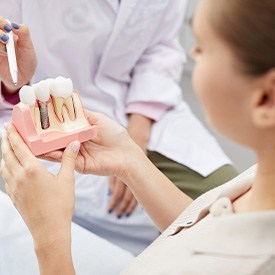
The treatment process for dental implants often takes months at a time. Even so, you can rest easy – the posts’ benefits make them worth this time and effort! We perform implant placement in-house to ensure you get the best restoration results possible. Since Dr. Laura Mears supervises it, you’ll benefit from her advanced skills and expertise. In fact, you can expect four steps from our implant process: consultation, surgery, osseointegration, and delivery of the final restoration.
Initial Dental Implant Consultation
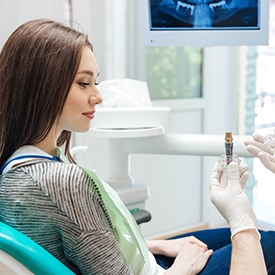
Ahead of the actual surgery, you’ll visit our office for a consultation. This session allows us to confirm your treatment goals, current oral health, etc. Once we have those details in hand, we’ll review them to see if dental implants suit your smile.
If we conclude you don’t qualify for dental implants, please don’t worry. You can become a good candidate later through further dental work – tooth extractions, gum disease treatment, and so on. Getting those “extra” services would make your mouth strong enough for implant posts.
Dental Implant Surgery
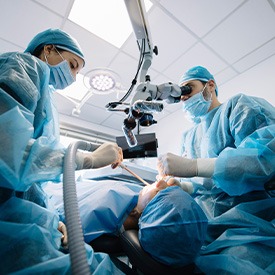
As stated before, our practice performs dental implant surgery in-house. Dr. Laura Mears oversees the placement work alongside the rest of our team. That being the case, you can trust you’ll have amazing results!
The dental implant surgery will involve four key actions:
- Numbing – Before anything else, we’ll numb the treatment site so it doesn’t hurt during placement. The most you’ll sense is a slight pressure.
- Incision Work – Dr. Mears will make an incision in your gums to create space for your future implant.
- Placement – With the incision made, we’ll place the implant post before suturing your gums shut.
- Capping – We’ll conclude your surgery by putting a protective cap over your dental implant.
Dental Implant Osseointegration & Abutment
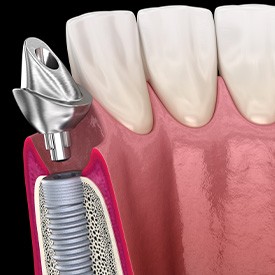
Your dental implant(s) will slowly fuse with your jaw once the surgery is over. Through this process of “osseointegration,” the post(s) will become secure and permanent parts of your mouth. You’ll just need to be patient – the fusion often takes 4-6 months to fully wrap up.
After the implant fusion ends, you’ll attend a follow-up surgery at our office. We’ll then place the abutment – a special metal connector – that secures your restoration. A dental lab will craft this latter prosthetic while you heal from the second surgery.
Delivery of Dental Implant Restoration(s)
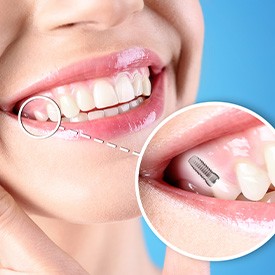
Our team will deliver your dental implant’s final restoration at your treatment’s end. In general, this device could range from a dental crown or bridge to an implant denture. The restoration type will depend on how many teeth you’re getting replaced.
It shouldn’t take us long to fit your final restoration. To do so, our dental team only needs to apply some dental cement; that material should hold it in place. Throw in a few last-minute changes to ensure good results, and you can leave our office with a full and pretty smile!
Benefits of Dental Implants

At JL Dental, we understand the dangers of allowing your missing teeth to go untreated, and one of the best options for tooth replacement offered by our practice is dental implants. As their name implies, dental implants are placed into the jawbone to provide a variety of benefits that no other restorative option is able to. Some of these advantages include:
- Restored bite strength.
- Added durability.
- Natural appearance.
- Long-lasting.
- Comfortable and natural feel.
Many people don’t realize that tooth loss leads to bone loss because, without roots, the jawbone begins to naturally deteriorate. But when you replace those missing roots with titanium dental implants, you can halt the damaging process and hang on to your youthful facial shape.
Indications for Dental Implants

Dental implants are a versatile option for tooth replacement. If you’re missing a single tooth, one dental implant and crown can offer relief. If you’re missing several teeth, we can anchor a bridge with dental implants, and patients unhappy with their dentures can opt for implant-supported dentures, too. To learn how they can help your smile, contact us today.
Missing Single Tooth
An implant-retained dental crown can replace the entire structure of a single missing tooth without having to alter any of your surrounding teeth. The custom-crafted crown will be placed atop a titanium post to provide stunning aesthetic results that look and feel completely natural.
Missing Multiple Teeth
If you’re missing multiple teeth in a row, an implant-retained bridge offers added stability and security. With a traditional bridge, your existing surrounding teeth need to be reshaped to act as anchors for the prosthetic. With dental implants, your natural teeth will stay unaltered, allowing you to preserve them as-is.
Missing All Teeth
Implant-retained dentures offer better stability and security compared to traditional removable dentures. Prosthetic teeth that are held in place with dental implants do not slip or slide around like those that simply rest on your gums. Plus, there’s no need for a messy denture adhesive or cream. Implant-retained dentures also need to be replaced far less often than a traditional set, as the jawbone stays healthier and retains its full, youthful shape.
Understanding the Cost of Dental Implants

The cost of each patient’s dental implant procedure varies drastically. There are countless factors that play into this, including how many teeth you need to have replaced, what restoration you’re getting, and whether you need any preparatory procedures like a bone graft. Because each patient’s situation is so unique, there’s no standard or default price. The best way to learn about the cost of your procedure is to schedule a consultation with Dr. Laura Mears. She’ll walk you through the process and answer any questions you may have. In the meantime, you can also read on to learn more about the cost of dental implants!
Preliminary Treatments & Dental Implant Surgery

Sometimes, patients aren’t candidates for dental implants right away because of an existing oral health problem, like gum disease. The good news is that we can typically intervene with the restorative care necessary – whether it’s periodontal therapy or a tooth extraction – so those in our treatment chair have a healthy foundation and a beautiful, strong smile. If you need preliminary care, you can have peace of mind knowing we will review the cost with you at your consultation.
It's also important to know that the implant surgery has a cost of its own. Fortunately, we perform the entire treatment process in-house, so you don’t have to worry about bills from different practices, money spent on driving all over town, etc.!
The Parts of Your Dental Implant
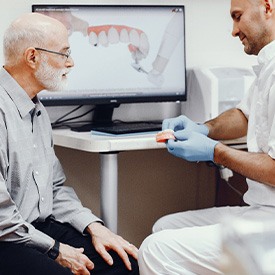
Another important cost-related factor is the implant itself. More specifically, we need to consider:
- The number of dental implants needed
- The type of restoration (like a single crown vs a full denture)
- Whether the implant is crafted from zirconia or titanium
- The implant manufacturer
If you have any questions about the restoration we recommend, the materials we use, or the manufacturer we’ve partnered with, please don’t hesitate to let our Arnold dental team know! We’d be more than happy to answer any questions you have, especially since dental implants require an investment of your valuable time and money.
Dental Implants Can Save You Money – Here’s How

Speaking of the time and money that needs to be invested in the treatment process, you might be wondering if dental implants are really worth it. The answer is “yes!” After all, this state-of-the-art tooth-replacement solution is known for lasting for several decades with proper care (while dentures and dental bridges often need to be replaced every 5-10 years). Plus, keeping them in pristine condition doesn’t require anything complicated; just commit to good oral hygiene habits, like flossing every day, and quit bad ones, like smoking.
Does My Dental Insurance Cover Dental Implants?

Typically, dental insurance providers don’t cover the cost of dental implants. As always, there are some exceptions. For example, preliminary treatments and the final restoration are sometimes partially covered. So, it’s definitely worth reading through the fine print on your plan and reaching out to us with any questions you have!
How to Make Dental Implants Affordable

If you want to restore the look, health, and function of your smile with dental implants, but you can’t pay for the entire cost in one lump sum, don’t worry – you don’t have to! With CareCredit, you can break up the price into smaller, monthly chunks that work for you. That way, you can get your smile back without stressing about the cost.
Dental Implant FAQs

Dental implants in Arnold are a great option to permanently treat tooth loss. Although you’re excited to enjoy a nearly perfect replica of your real teeth, you’re sure to have several concerns before you’re ready to commit to the treatment. We understand your apprehensions. Here are the answers to a few of the most common questions patients ask us about dental implants.
How long do dental implants last?
Dental implants are the most reliable option to treat tooth loss. In fact, they can last for 30 years or more with the right care, like maintaining your oral hygiene. Your lifestyle and oral hygiene habits are the largest contributors to the success of your smile. It’s best to brush twice daily, floss nightly, and rinse your mouth with an antibacterial wash at least once a day. Your implant dentist in Arnold also recommends avoiding any chewy or hard foods. By taking the time to care for your new smile, you can ensure your dental implants thrive for decades, unlike traditional treatments that need to be replaced every few years.
Can I take dentures out?
Many people choose dental implants because they are permanent. Your jawbone will fuse to the posts through a process called osseointegration, allowing them to stay in place forever. Only a dental professional will be able to take them out; however, some dentures are removable for cleaning purposes.
Am I too old for dental implants?
You’re never too old for dental implants. If you’ve finished growing, age doesn’t matter when determining your candidacy for the treatment. Although elderly adults can benefit from the procedure, your implant dentist may recommend a few extra precautions depending on your oral and general health.
Is there anything I shouldn’t eat with dental implants?
You can enjoy many of your favorite foods after you’ve healed from your dental implant surgery. During your recovery, we recommend sticking to soft foods. Besides avoiding those that are hard or chewy, don’t consume alcoholic, sugary, or acidic beverages. You also shouldn’t use a straw. Once your jawbone has fused to the posts, you’ll be able to eat almost everything you could with your natural teeth, but it’s still best to skip those that are sticky because they can dislodge or loosen your restoration. To prevent any unexpected complications, don’t chew overly hard foods, like ice or nuts.
Do I need bone grafting before getting dental implants?
Many patients need bone grafting before their placement surgery, but it isn’t always necessary. Your dental implants require adequate bone support to succeed. If you have areas of weakened bone, you may require the additional treatment, which will add thickness to your jaw using material from a donor or another area of your body. Although it will add another step to your plan, if we recommend the procedure, it’s crucial to the viability of your new smile. We’ll review a CT scan of your jaw to determine if your bone has enough density to support your implant posts.
